April 2015, Issue #2
FRAGILE ONGOING
TABLE OF CONTENTS
Editorial
I. OPENING REMARKS
Jan Clausen
“This Moment the World Continues”: Writing under the Sign of Species Suicide
Robin W. Kimmerer
When Earth Becomes an ‘It’
Kathleen Dean Moore
The Rules of Rivers
II. GRIEVING
Cynthia Travis
The Music of Grief
Megan Hollingsworth
Pacific
Ruth Wallen
Cascading Memorials: Public Places to Mourn
Joan Kresich
Letter to a Yellowstone Wolf
Susan Marsh
Elegy for the Cranes
 The Hunters
The Hunters
Karla Linn Merrifield
William Bartram Triptych
Dana Anastasia
trinkets
Gillian Goslinga
To Witness
III. GUIDED
Deena Metzger
Dreaming Another Language: She Will Not Kill
Alexandra Merrill
Homage to Bees
Sheila Murray
Infiltration
 Prey
Prey
Judy Grahn
Dragonfly Dances
Laura D. Bellmay
A Call from the Edge
Carolyn Brigit Flynn
Grandmother Squirrel
Nora Jamieson
Fleshing the Hide
Sara Wright
Cardinals at the Crossroads
Valerie Wolf
Dreaming the Future
Alexandra Merrill
Homage To Bees
In September 2007, while walking with friends, single file through the ancient Arc of Appalachia, countless swarming bees appear among us. We keep walking, casually and stupidly, brushing them away. Suddenly their focus centers in on my body and I am under the siege of their collective strike. Severely allergic to bee venom, I realize I must get to a safe house. I walk there and lie down on the floor of a quiet room. I slide quickly into an anaphylactic shock state from which, with help of friends and emergency medicine, I will later return. For now, I offer my attempt to bring image and words to the impact of that collaborative journey of mutual affliction, to the wise teachings from the bees as well as I can translate them, and then finally, to my gratitude for the honor of bearing witness to their suffering and our complicity in creating their struggle.
A maternity of bees: the story of my journey into and out of anaphylactic shock
Still hearing my own words as a tail wind, “a good day to die,” I wing up, weightless to where nothing is broken apart, where all that has been long broken is waiting to be made whole by being told. Here, I am torn and whole, folded into patchwork clouds, untethered from time, reviewing a summer afternoon of 1944 and we are at war and I am six and busy, killing garden bees with Grandma’s red DDT sprayer gun. I will spray them until they’re dead because I love her and she told me to use the gun. Squirting the smelly sprayer barrel over and over until they’re all down in the dirt under the roses, I am ashamed to enjoy watching the bees falling down dead. I loved the little bees when they used to come sit here on my chubby fingers.
My eyes are down in shame. I can take a deep breath away from shame. Now I am sliding down into an old stump hole. Here, a full- bellied honeycomb, glowing in her own dark luster hums an endless prayer for all the wrongful deaths. Curling my cloud self around the waxy prayer body and inhaling honey scent, I am forgiving my small heart and Grandma’s old one. Shame is weakening. I breathe again, in and then out, more easily this time.
An outside hammer force punches my lungs to gasp toward air. Wild wrath rises to counter the uninvited foreign volts. I oppose, fail, relent, accept and crash back down onto this cold table, to these humans, these men and women, under cold white lights. I float out and back, too weak to go far. This time I accept the breath as my breath. Countless tiny bees buzz all over my stinky, sticky self, licking me warm and clean into clock time. A maternity of bees reminds me to remember what I must now know and do.
Back Under the Lights in the Emergency Room
For a time, I am noticing the dry blinking of my eyes, and a cataract blur of shapes leaning in toward me under the dead cold light above us. I am sad to be losing the delicious sensation of all-over bee-licking as it fades off my body and as my eyes attach to the Emergency Room clock and my ears turn to the anxious buzzing of human voices around the repair table where I have been deposited. Bereft. Bereft is the word that helps my emotions crash onto the sterile benevolence of this clinical slab. They are caring for me. I accept.
In the next days, I am homesick, forlorn, aggrieved. I can’t remember my assignment anymore. I pray to remember it. As I learn to pray to the bees, asking them to help me remember, it occurs to me that I have acquired a secretarial capacity. I begin to notice a rhythmic buzzing in my ears. Standard tinnitus is not a sufficient explanation. The licking sensation returns each time I bring attention to the sounds in my ears. At first there is nothing to write down.
Soon I understand that images precede the words. So I begin to paint the first in this series of 8 x 8 inch images. With no interest in their meaning, I copy onto the paper. When one image is done, I know because I get the licking feeling on my skin. At that point, a rather monotone neutral voice drops a statement down into my ears and the buzzing stops as I write down the text. All the little messages arrive in the same capsule form without much tonal inflection—as if they are being droned in a medieval chapel, or as if I am a nun transcribing manuscripts with quill onto parchment miniatures. In all of these messages, one voice is speaking both AS the collective and for the collective to an invisible (perhaps human) audience.
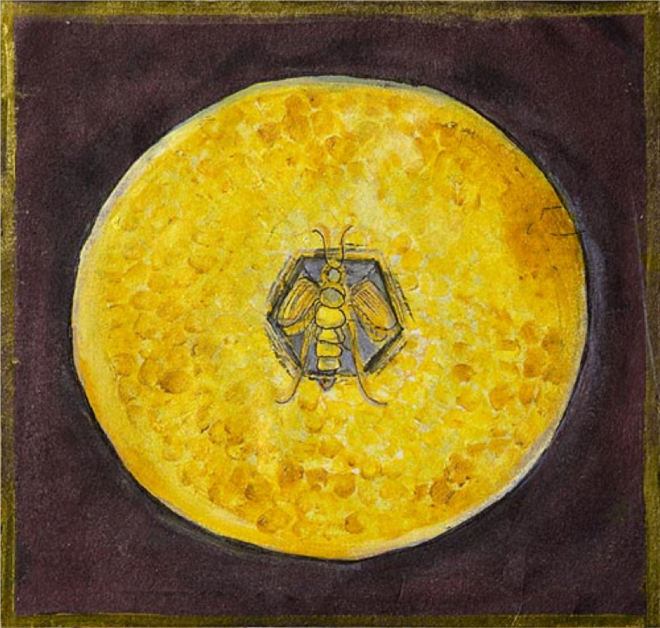
I am obviously not the queen bee. Our hive-bound queen only breeds us and uses the venom to kill her rivals until they kill her. She is pale, ungainly and awkward inside her bulk while I am lean, lithe and agile. I fly free, am devoted to her and the hive. I work to sustain our culture, as do all workers. Workers are all female and our drones are male. Workers collect the nectar wherever we are living and bring it directly back to the waxy cells to store. We all work hard.
Animals and humans often attack us so each of us has to carry a survival portion of venom. When I have to sting, I do it discreetly and precisely. When I sting, all of us receive the message immediately and come immediately to multiply the dosage by our number. If one is challenged, all arrive. Our venom has always been mighty: wounding, killing, and occasionally curing.
Currently, all of our colonies are endangered and at risk of collapsing. Insecticides. We are all at risk together. We’ll have to collaborate with humans to save all our communities. I know I speak bluntly. No time left for imprecision: it is better to speak blunt truth than to play nice. You pay a price either way, bee or person.
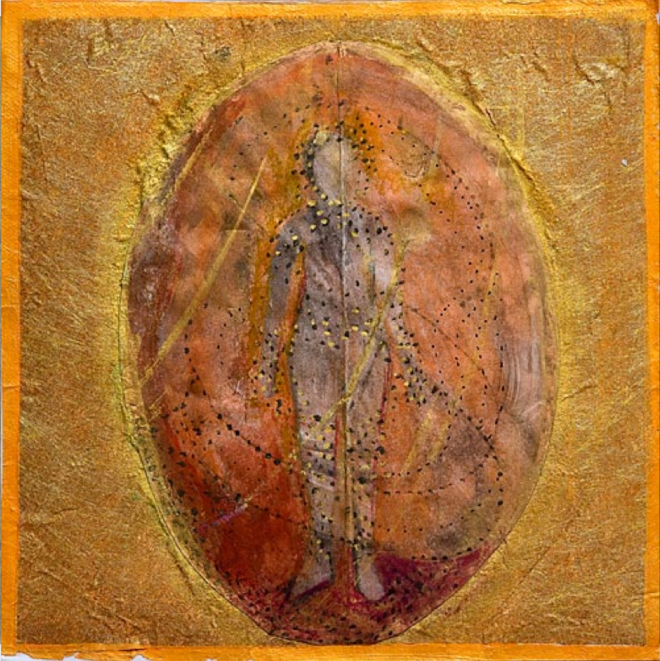
A swarm of us isn't necessarily a hostile force. Most often, we are either acting in legitimate self-defense or traveling together to a new location. The woman who trespassed on our well-hidden hive that day didn't know she was stepping on marked territory and wasn't prepared for our response. She was blindly following the lead of a man who appeared to know everything about the forest. He didn’t. It was an accident, you might say. But from our perspective, it was not at all an accident. As we kept stinging her, we heard her say out loud to the forest
“Well, this would be a good day to die.”
That is the very moment we knew to stop, satisfied with her response. We left her to her own conclusions. Those of us who hadn't died stinging flew down under our ground with the day’s collection. We knew that our dosage had been precise and correct. We thought she’d be back, working for us. We were right. We can see through time because of the structure of our eyes. We see behind and ahead, all at once. And we know humans don’t yet have that capacity.
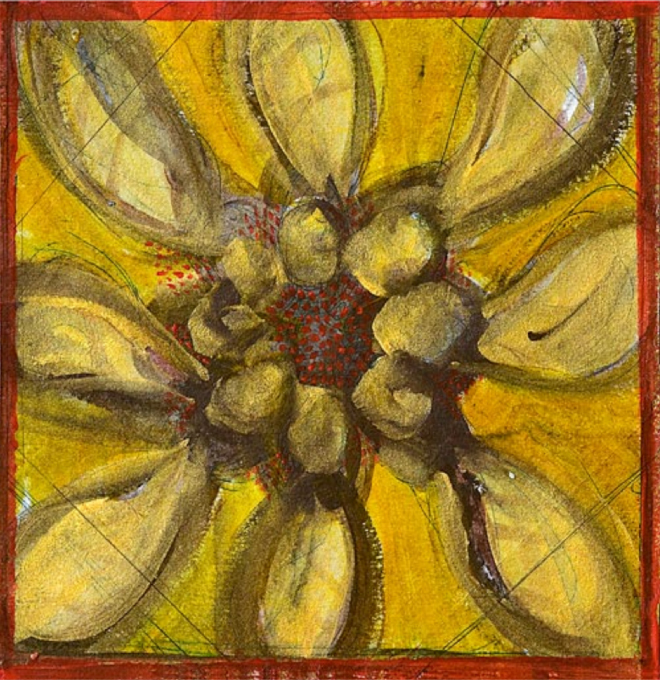
When we all sting down into her, she is not afraid. She walks slowly and deliberately as if she has been waiting for us, almost offering to receive us. She gets as far as the edge of the woods and lies down in the little house to let her heart go gently. A few of us are buzzing around, up above in the shadows, watching the people who arrive and beg her to stay here. Please stay,” they say.
“Stop calling me. I am busy learning” is what we hear her thinking as they call her back. They can’t hear her thoughts but we do. We know she’d be happy to leave and she knows it is in the hands of the Mother, not her mind.
She returns to her people eventually, healed by our venom, and permanently connected to us by a constant internal buzzing resolve, the long-term after-effect of our medicine. She can speak and sting when necessary. And, of course she pays the high price every time—predictable shunning, exile, accusations of meanness. Workers and drones, we all understand this. She will learn to live with the loneliness of working leadership. And she has no desire to be the queen, anyone’s queen, except her own.
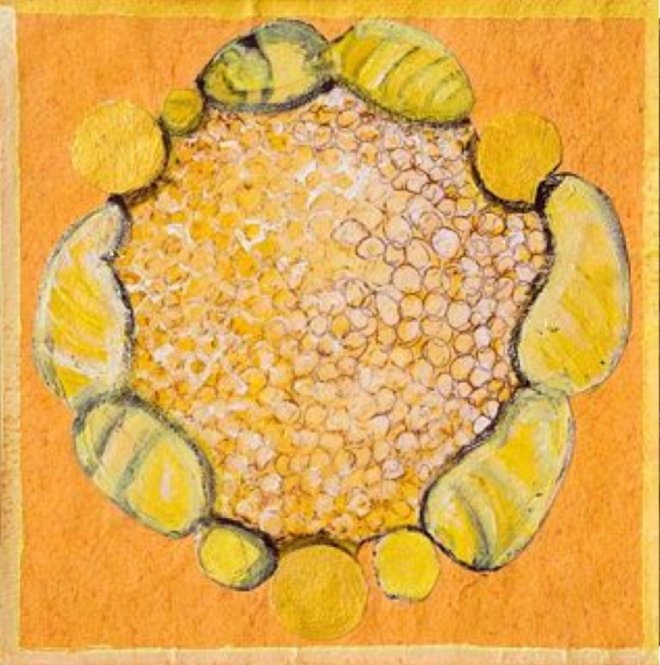
Our waxy cells, in no way prisons,
are strongholds for our medicine.
The old queen lives inside
with the cells for her whole lifetime.
She will breed us, birth us and wait
inside her chamber to fulfill her time
killing her rivals until one kills her--
and becomes our new queen.
Such is our way, the law of our community.
The young always come along and we always leave.
We have no problem with this.
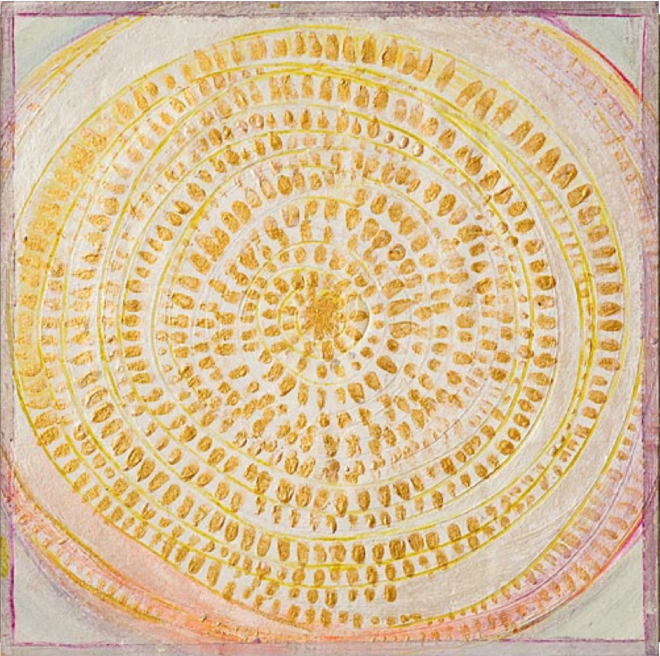
h.o.w.w.e.
s.e.e.
w.e.s.e.e.a.l.l.a.t.o.n.c.e.
w.e.d.o.n.o.t
b.r.e.a.k.u.p.
e.x.p.e.r.i.e.n.c.e.i.n.t.o.
b.i.t.s.a.n.d.p.i.e.c.e.s
s.o.
w.e.a.r.e.a.l.l.o.n.e
a.n.d.w.e.a.r.e.a.l.l.h.e.r.e.
a.l.w.a.y.s.a.n.d.n.o.w.
a.u.n.i.f.i.e.d.f.i.e.l.d.
o.f.a.w.a.r.e.n.e.s.s.
i.n.r.e.a.l.t.i.m.e.a.n.d.s.p.a.c.e
a.n.d.s.o.a.r.e.y.o.u.
i.f.y.o.u.w.i.s.h.t.o.b.e.
j.u.s.t.c.h.a.n.g.e.y.o.u.r.
p.o.i.n.t.o.f.v.i.e.w.t.o.
b.e.w.i.t.h.u.s.
y.o.u.a.r.e.w.e.l.c.o.m.e.
Seven years to the day after the day I was stung, in September 2014, my dear neighbor here in coastal Maine is walking in our woods with her dog on this land where I still live. Directed by her dog’s bark to look up into a beech tree, she sees the elegant hanging palace of nine golden combs, covered with countless honey bees who have travelled with their queen to this winter palace. Knowing that I owe them, I ask family, neighbors and local bee-keepers to help create a suitable winter home for the immigrant colony. I feed them the fluids they need as they prepare for winter. They are gentle, busy and receptive. I hope they make it through the long, stark cold of our Maine winter.
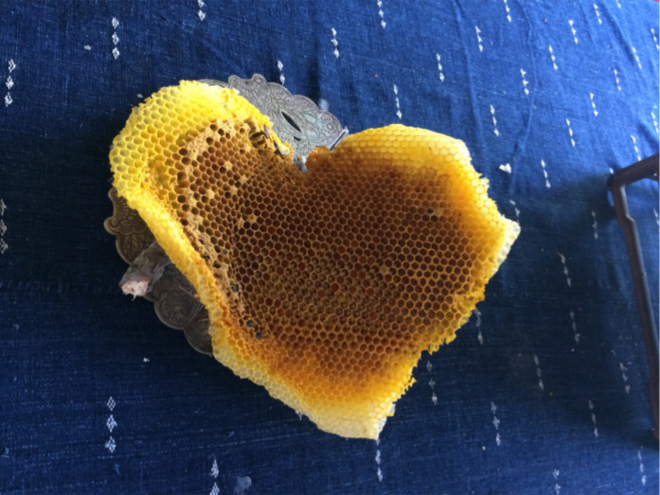
“Our signals from the past are very weak, and our means for recovering their meaning still are most imperfect… The beginnings are much hazier than the endings, where at least the catastrophic action of external events can be determined...Now and in the past, most of the time, the majority of people live by borrowed ideas and upon traditional accumulations, yet at every moment the fabric is being undone and a new one woven to replace the old, while from time to time, the whole pattern shakes and quivers, settling into new shapes and figures. The processes of change are all mysterious uncharted regions where the traveler soon loses direction and stumbles in darkness.”
George Kubler, The Shape of Time
Yale University Press, 1963
Aftershock Notes:
In my decades of experience working with large hive-like groups of women on leadership development, I have often needed to stand tall as the queen of my own hard-earned authority, while a fine younger woman leader and sometimes a group of less experienced challengers make what I experience as a swarm attack on my designated leadership. I now see the challenge as a deep and natural human need to match strength and competence in order to claim our own personal authority. I have learned to welcome these strong challenges as younger strength testing itself. At several moments in my work life, this natural challenge has been laden with the toxic sting of unconscious misogyny, both mine and theirs. Having come to understand this universal venom, I do not take these moments as mean-spirited stings from a reactive hive but rather as the sign of a residual toxic disorder in our species. To take these poisoned moments personally is not a useful response.
I’m a woman leader who is aging. Instead of clinging to my long-held position of acknowledged leadership, I have to discern when it is time to let go and move aside. This is different from disappearing myself. My wish is to make time and space to support the emerging competence of new leaders. Their time has come and mine is going. If I take the lesson of the hive, I accept this dynamic just as I learned to accept my own earlier need to separate from my mother, my sisters and my teachers in order to learn to mother and sister myself. This way, I can continue to have my own internal authority while supporting others’ growth-in -community, a benevolent long-term function of human hive life and an antidote to collective global misogyny, one of the most lethal of our human colony’s collapse disorders.
A physiological benefit of the massive stinging is that I have been fully relieved of the progressive and crippling arthritic pain in my hands, a legacy inherited from my father. As a result, through my own hands, I feel a spirit level connection with my dear father who suffered long and hard with the degenerative arthritis pain in his big bony hands. My big, bony hands have heat and a buzz but no pain.
Another long-term benefit of the sting is that the episodic tinnitus buzzing in my left ear has become an invitation to turn inward to listen to my own knowing. When I do that, the buzzing disappears and I hear myself way more accurately. Once again I know what I know and must do about the problem at hand.
Learning to live in collaboration with the benevolent bees as neighbors and allies in our blended community helps me experience the interdependence of all forms of life. My tiny practice of awareness is as small as one tiny bee, smaller even. My little prayers for peace between all species, the invisible thought forms that float up the hill to the bees, all this new practice keeps me a more mindful participant in the joys and sorrows of our beautiful and troubled world.
There is a multi-faceted healing power in the bee venom. It is my good fortune to have been treated by an extremely potent and benevolent remedy from the colony of Appalachian bees to whom I offer this grateful bow.
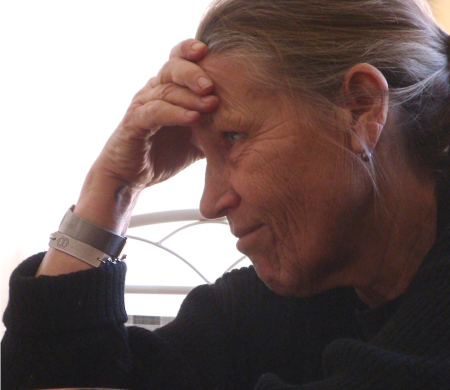
Alexandra Merrill has been living and working in Maine since the 1980s. Her long-term focus has been on creating experiential education models to support the development of women’s leadership. Along with these replicable models, she has developed retreat models for the internal work needed for leadership in our complex world. Currently involved in linking her group dynamics theory to specific practices and her program content to healthy process, she is working on integrating this information into a workbook for group leaders who are looking for a model inclusive of all our human diversities, especially around our increasingly fluid understanding of gender.
www.alexandramerrill.com
Want to comment on any Issue of Dark Matter, fill out the form here.
Copyright © 2014-2021 Dark Matter: Women Witnessing - All rights reserved to individual authors and artists.
Email: Editor@DarkMatterWomenWitnessing.com
Please report any problems with this site to webmaven@DarkMatterWomenWitnessing.com
